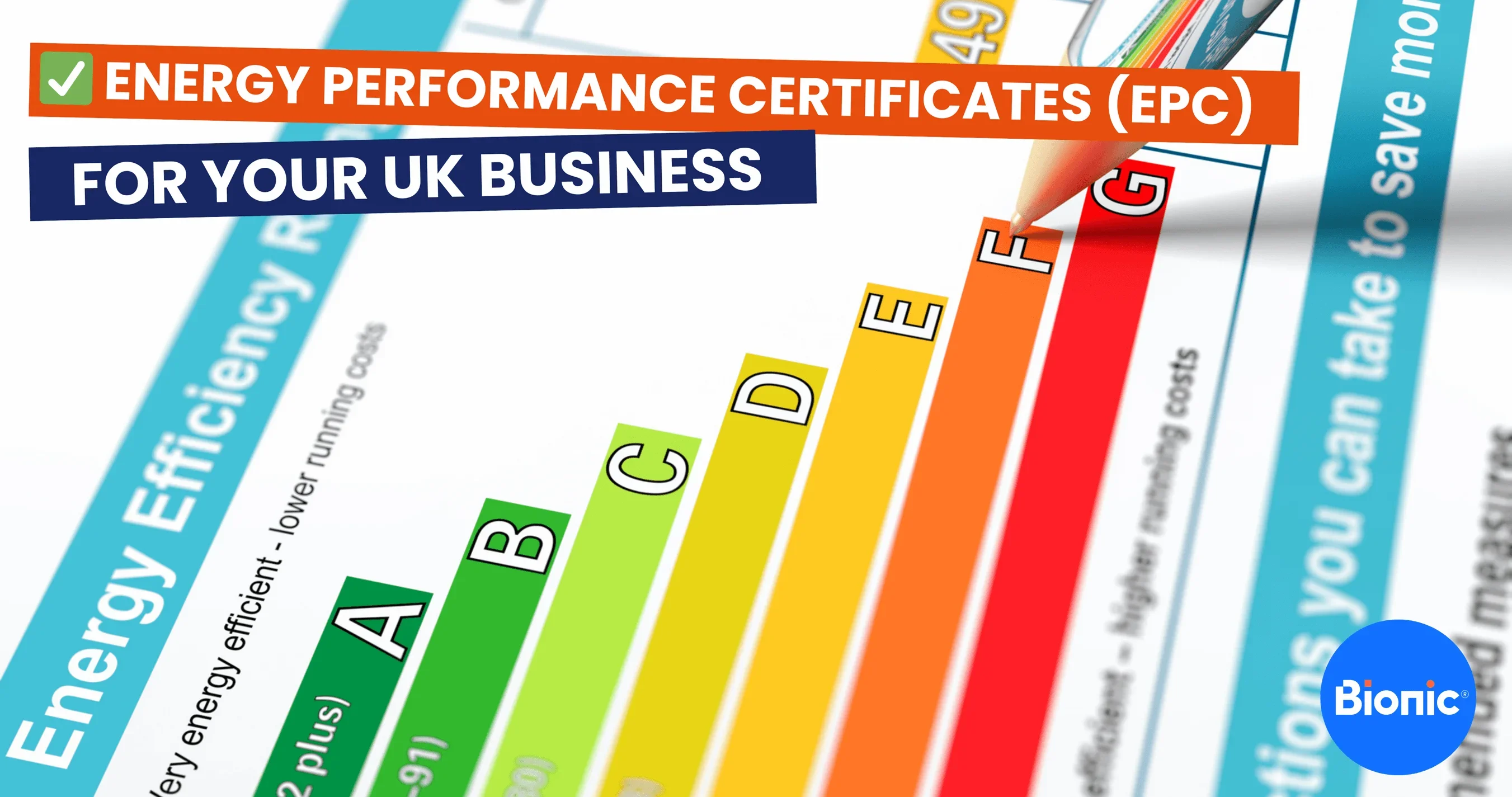What a commercial Energy Performance Certificate (EPC) for business?
An Energy Performance Certificate (EPC) rates buildings on their energy efficiency. Ratings are given on a scale of A to G, with A being the most efficient and G being the least.
A Non-Domestic Energy Performance Certificate (NDEPC) and a Recommendation Report (RR) have been a legal requirement for all non-domestic buildings under construction, on sale or up for rent since October 1, 2008.

In the UK, an Energy Performance Certificate (EPC) is now a standard requirement for most commercial properties when they are built, sold, or let. It provides landlords, tenants, and buyers with a quick indication of a property's energy efficiency and the potential costs associated with heating and powering it.
These commercial EPCs apply to non‑domestic properties, such as shops, offices, warehouses, factories and hospitality venues, and are different from domestic EPCs used for homes.
If you’re looking to buy or rent a property, an EPC will give you an idea of how much you’ll need to spend on energy - the higher the rating, the more energy-efficient it is and the less you’ll spend on heating - and although EPCs are usually associated with domestic properties, all commercial properties should also have one.
Five-point summary on commercial EPC ratings
- A commercial EPC (Energy Performance Certificate) rates non‑domestic buildings in England, Wales and Northern Ireland from A (most efficient) to G (least efficient) based on their fabric and services.
- Since April 2023, most rented commercial properties in England and Wales must have a minimum EPC rating of E to be legally let, with all let properties required to hold a valid EPC certificate by 2025.
- Government policy signals that minimum EPC requirements for commercial buildings are likely to tighten further, with proposals to move towards band C by 2028 and potentially band B by 2030.
- Improving your commercial EPC can cut energy bills, support net zero and ESG targets, protect asset value and help landlords avoid fines, voids and future letting restrictions.
- Simple measures like LED lighting, heating controls, insulation upgrades, efficient HVAC and solar PV can all improve EPC scores, and a qualified non‑domestic energy assessor must produce the certificate. If you don't comply with the commercial EPC guidelines, you could pay up to a £50,000 fine.
What is a commercial EPC?
A commercial EPC rates non-domestic buildings on their energy efficiency. EPC regulations mean ratings are given on a scale of A to G, with A being the most efficient and G being the least energy efficient.
How do commercial EPC ratings work?
The EPC rating is based on the property itself, rather than how the occupier uses energy. This means things like insulation, windows, heating, cooling, ventilation and lighting systems are all considered.
The certificate also includes a reference energy cost, a carbon emissions figure and a recommendation report showing how you could move up one or more bands.
Minimum EPC standards and rules from 2025 to 2030
As of April 2023, most commercial properties in England and Wales must have an EPC rating of at least E to be legally let, covering both new and existing leases. This is known as Minimum Energy Efficiency Standards (MEES).
By April 2025, all rented commercial properties are expected to have a valid EPC certificate, meaning landlords with expired EPCs need to renew them even if they are not currently re‑letting the space.
The government has consulted on tightening standards further, and minimum EPC ratings could rise towards C by around 2028 and possibly B by 2030 for let commercial buildings. Nothing has yet been confirmed, and final dates and details may change.
Landlords who ignore MEES risk enforcement action, financial penalties and, in some cases, may not be able to grant or renew leases until improvements are made or a valid exemption is registered.
Why were EPCs introduced?
EPCs were first introduced by the government to help improve energy efficiency in buildings and reduce greenhouse gas emissions. They also exist to raise awareness of the amount of energy a building uses.
This is helpful if you are looking to buy or rent a commercial space for your small business. It gives an idea of how energy efficient the building is and how this could impact energy bills.
How to get an EPC for a commercial property
To get a commercial EPC, a commercial energy assessor needs to inspect your property. The type of assessor you’ll need will depend on the complexity and features of the building. You can find a local, accredited, non-domestic energy assessor by visiting https://www.ndepcregister.com/searchAssessor.html
Your assessor can then carry out any of the following:
- Energy Performance Certificate (EPC) and Recommendation Report (RR)
- Display Energy Certificate (DEC) and DEC Recommendation Report (DEC-RR)
- Air Conditioning Inspection Report (AC-REPORT) and Air Conditioning Inspection Certificate (AC-CERT)
You can view the EPC and RR for any commercial property from the non-domestic EPC register by entering the postcode at https://www.ndepcregister.com/reportSearchAddressByPostcode.html
You must use an accredited non‑domestic energy assessor for commercial EPCs, and they will visit your property to collect data on the building fabric, heating and cooling systems, lighting, controls and any on‑site renewables.
Once the assessment is complete, your EPC is recorded on the national non‑domestic EPC register, where you can search by postcode or report reference number to download copies.
A commercial EPC usually lasts for 10 years unless the building is significantly altered, in which case a new assessment is recommended to reflect the changes.
What happens during an EPC inspection?
After you've booked an assessment with an accredited energy assessor, they’ll visit your property to check things like insulation, heating systems, and lighting.
After the inspection, you’ll receive an EPC rating (from A to G) along with recommendations for improving energy efficiency.
If your rating is low, you can make upgrades, like better insulation or energy-efficient lighting, before getting reassessed. Businesses and landlords often need an EPC to comply with regulations or attract tenants.
When do EPCs need to be provided?
EPCs should be provided if a building is built, rented or sold - and this applies to any home or business premises. EPCs need to be available for potential buyers or tenants to help with the decision-making process. They should be renewed every few years to reflect the state of the building.
If you decide to make your business premises, such as an office, more energy efficient, you may want to redo your EPC to show that it has a better energy performance and get proof with an official energy rating.
How are EPC ratings calculated?
There are several factors that are used to calculate a building’s energy efficiency rating. These include:
- Insulation levels
- Type of heating system
- Lighting installed
- Ventilation
- Age and construction of the building
- If renewable energy is used
Using the areas above, officials consider the overall energy usage of the building and the C02 emissions it produces to give it a final assessment and rating.
How are savings and performance measured in an EPC?
Your building's EPC rating is based on insulation, heating systems, and lighting. The certificate also estimates potential savings by showing how much energy the property currently uses before suggesting improvements.
If you make upgrades, like better insulation or a new boiler, you can get a new EPC to measure the impact.
Businesses use EPCs to identify cost-saving opportunities, while landlords need them to meet Minimum Energy Efficiency Standards (MEES). A higher rating can even boost property value and appeal.
Who carries out a commercial EPC?
Commercial EPCs for businesses can only be carried out by an official commercial energy assessor. This is because professional energy assessors have the expertise and qualifications needed to do a detailed assessment of your business premises. You’ll want to make sure you go with an assessor that is officially registered so your certificate is valid.
The type of assessor you need largely depends on the size and features of your building. If you are not sure which type of assessor to go with, you should speak to a commercial energy assessor to point you in the right direction. You can find the right assessor on the government website.
How much does a commercial EPC certificate cost?
The cost will vary according to the type and size of the building that is being assessed. For smaller buildings, a commercial EPC usually costs between 100 and £300. For larger or more complex buildings, you can pay up to £1,500. The cost can depend on floor area, layout, number of zones and the information you can provide to the assessor.
In general, the simpler the use of a property, the lower the cost of the EPC - getting an EPC for a single space, such as a warehouse, should be cheaper than an office space that has been divided into workstations, meeting rooms and breakout areas.
Multi‑let offices, shopping centres and industrial estates often cost more to assess because each distinct area may require separate modelling.
How long is a commercial EPC valid for?
A commercial EPC is valid for 10 years. If your EPC expires, you’re only legally required to apply for a new one if you’re looking to renew tenancy agreements, create new tenancies or sell the property - a new EPC is not required simply because an existing EPC has expired.
If you are a commercial landlord, your property needs to meet certain EPC requirements and energy efficiency standards, regardless of whether or not your building needs a new EPC.
Do you need to display a commercial EPC?
If your business premises meet all three conditions below, then you’ll need to display your EPC by fixing it to the wall in a prominent area:
- The total useful floor area is more than 500 square metres
- The building is visited by the public
- An EPC has been produced for the building's sale, rental or construction
Examples include larger shops, showrooms, leisure centres, hotels and public‑facing offices, where the EPC is often displayed in the reception area.
What is the minimum EPC for a commercial property?
Legal minimum energy efficiency standards (MEES) for commercial buildings were introduced in April 2018, as part of the Energy Act. Although F and G are still the lowest ratings available, if you’re looking to lease or sell a commercial property, it must have a rating no lower than E.
As of April 1, 2023, you must not continue to let any commercial properties that don’t meet an E on their EPC.
The government is planning to update the way energy performance in properties is measured and scored. As part of the Warm Homes Plan, rental properties must have a minimum EPC rating of C by 2030.
Are there financial incentives for improving EPC ratings?
There are several financial incentives available in the UK to help businesses improve their EPC ratings. These incentives aim to support energy efficiency upgrades, reduce carbon emissions, and promote sustainable practices.
Government grants and schemes
The UK government offers various grants and funding schemes to help businesses improve their energy efficiency. These programs can help cover the costs of things like insulation, heating system upgrades, and renewable energy installations.
For instance, the Boiler Upgrade Scheme provides grants for the installation of low-carbon heating systems like heat pumps. The Energy Company Obligation (ECO) scheme focuses on delivering energy efficiency improvements to eligible properties. It's worth exploring all options to find suitable funding opportunities for your specific needs.
Tax incentives
To encourage energy efficiency improvements, the UK government has introduced tax incentives for businesses. One notable incentive is the zero-rate VAT on the installation of certain energy-saving materials in residential properties, which is applicable until 31 March 2027. While primarily aimed at residential properties, businesses operating in mixed-use buildings or those undertaking qualifying projects may benefit from this relief.
Green financing options
Businesses seeking to improve their EPC ratings can also consider green financing options. These include green loans and other financial products designed to support environmentally friendly initiatives. This financing can help fund energy efficiency projects, often with favourable terms to encourage sustainable investments.
Local authority support
Local authorities across the UK may offer additional support for businesses aiming to enhance their energy efficiency. For example, Manchester City Council provides information on available grants, loans, and support services to assist with energy improvements. Businesses should consult their local councils to identify region-specific programs and assistance.
What are the risks of not having a valid EPC?
There are several risks of not having a valid EPC, which can cause legal, financial, and reputational issues. Here’s what you need to know:
- Legal penalties and fines - A valid EPC is legally required when selling, letting, or constructing commercial premises. If your property doesn't have one, you could be fined between £500 and £5,000, depending on the rateable value of the property. Repeat or continued non-compliance can lead to further action.
- Delays in selling or letting premises - Without an EPC, you can't legally market a commercial property for sale or rent. This can cause costly delays in business operations or investments, particularly if you’re relocating, expanding, or restructuring.
- Restrictions under MEES regulations - The Minimum Energy Efficiency Standards (MEES) require all commercial buildings being let to have an EPC rating of E or above. If your property fails to meet this standard, you may be legally barred from renewing or granting new tenancies, unless you’ve registered an exemption.
- Reduced property value and tenant interest - A poor EPC rating, or no EPC, can put off potential buyers or tenants. This can lower its market value and reduce demand for your premises.
- Missed cost-saving and green funding opportunities - An EPC provides insights into a building’s energy efficiency and suggests ways to improve it. Without one, you may miss out on energy savings, government incentives, or green financing options tied to sustainability performance.
If you're unsure about your EPC status, it’s worth checking the EPC Register and speaking to a qualified assessor.
What are the penalties if you don't have an EPC?
If you don’t comply with the current commercial EPC guidelines, you could find yourself on the end of a hefty fine.
EPC Penalties are given to property owners or landlords who fail to provide a valid EPC to potential buyers or tenants using the building. And if your premises don’t meet the minimum standard of E or above, then you’ll likely face a fine. Penalties for non-compliance are based on the rateable value of a property:
- If a non-compliant property has been let for three months or less, the penalty is based upon 10% of its rateable value, from a minimum fine of £5,000 up to a maximum of £50,000.
- If a non-compliant property has been let for more than three months, the penalty is based upon 20% of its rateable value, from a minimum fine of £10,000 up to a maximum of £150,000.
If you try to get out of having an EPC by providing false or misleading information to the PRS exemption register, or you don’t follow a subsequent compliance notice, you can be fined up to £5,000.
What commercial properties are exempt from EPC?
Certain commercial properties can be exempt from MEES, such as some listed buildings where efficiency improvements would unacceptably alter character, temporary buildings, very short leases or properties where all cost‑effective measures have already been installed.
Your property should be exempt if it falls into any of the following categories:
- A place of worship.
- A temporary building that will be in use for less than two years.
- A stand-alone building with a total useful floor space of less than 50 square metres.
- Industrial sites, workshops and non-residential agricultural buildings that don’t use a lot of energy.
In some cases, you might not need an EPC for business premises if your building is due to be demolished.
It’s also worth noting that regulations apply to tenancies of between six months and 99 years, and so holiday accommodation that’s rented out for less than four months a year or is let under a licence to occupy is also exempt
There is also a ‘devaluation’ exemption, which means you’ll not have to make any changes to your building if alterations will devalue it. All exemptions must be pre-registered on the exemptions register and will last for five years once registered.
In England and Wales, landlords must register qualifying exemptions on the official PRS Exemptions Register and renew them periodically rather than assuming they are permanent.
Does a listed commercial building need an EPC?
If your commercial property is a listed building - meaning it’s of special architectural or historic interest considered to be of national importance and is listed on the National Heritage List for England - it doesn’t need a commercial EPC certificate if energy improvement requirements would 'unacceptably alter' the property's character or appearance.
How to improve an EPC rating
You may want to get ahead of future regulations by upgrading your premises now to improve its EPC rating. Or you may need to improve the energy rating of your premises now to meet the minimum requirements. In either case, here are some key steps to follow:
- Improve insulation - installing better insulation in walls, floors and roofs will stop heat from escaping and keep it in.
- Upgrade the heating - upgrading from old-fashioned boilers to modern heating systems like heat pumps can significantly reduce heat loss and improve energy efficiency.
- Use LED lighting - It sounds simple, but it’s often overlooked. Make sure you replace any traditional lightbulbs with energy-efficient lighting to lower your electricity usage.
- Install renewable energy systems - If you can, invest in upgrading to solar panels, mini turbines, biomass or hydro systems - if it’s suitable. This will mean generating your own energy and relying less on fossil fuels, which will also pay off in the long run.
- Get double glazing - If you don’t have it already, replacing single-glazed windows and doors with double or even triple glazing will prevent heat loss.
- Make ‘green’ rules - Make energy-saving rules and encourage your employees to follow them. This could be things like turning off lights, switches and computer systems when the day is over.
If you can’t afford to carry out all these steps, consider picking one or two that are achievable and start there - you’ll be well on your way to having a more energy-efficient business.
Consider things like improving your building management systems (BMS), sealing air leaks, installing variable speed drives on fans and pumps, and adding solar PV to reduce overall carbon emissions.
For older commercial buildings, planning a phased improvement plan to target band C and then band B can protect long‑term asset value and reduce the risk of future non‑compliance.
Why switch energy with Bionic?
A better EPC rating usually reflects a more efficient building, which can translate into lower heating, cooling and lighting costs for occupiers and help businesses hit their carbon and ESG targets.
Improving your EPC often goes hand in hand with reviewing business energy contracts, installing smart meters and investing in efficiency projects that reduce both consumption and non‑commodity costs.
Making sure your building's energy efficiency standards are up to scratch is a great way to save energy and cut the cost of your energy bills, but if you’re on an expensive commercial gas and electricity contract, then the rates you’re paying will quickly eat into these savings.
That’s why it pays to get in touch with the tech-enabled experts at Bionic - we’ll compare deals from our panel to make sure your business is on the best rates from one of our trusted suppliers.
To start a business energy comparison, pop your postcode in the box at the side of the page or speak to Bertie. Our live chat is available from 9 am to 5 pm, Monday to Friday.
FAQs about commercial EPCs and your business
Here’s an at-a-glance guide to some of the most frequently asked questions about non-domestic EPCs for business:
What is a commercial EPC in the UK?
A commercial EPC is a legally recognised energy performance certificate that rates the efficiency of a non‑domestic building in the UK on a scale from A (best) to G (worst).
What is the minimum EPC rating for commercial property in England and Wales?
Most rented commercial properties in England and Wales must currently achieve at least an EPC rating of E to be legally let under Minimum Energy Efficiency Standards.
Do all UK businesses need a commercial EPC?
You usually need a non‑domestic EPC when you build, sell or let a commercial building in the UK, with some exemptions for specific property types and situations.
How long does a commercial EPC last in the UK?
A commercial EPC is typically valid for 10 years in the UK, unless major changes to the building’s structure or services mean a new assessment is needed.
How much does a commercial EPC cost for a small UK business premises?
Non‑domestic EPCs for small shops or offices often cost from a few hundred pounds, with fees increasing for larger or more complex properties.
Can improving my EPC rating reduce my UK business energy bills?
Yes, upgrading insulation, heating, cooling and lighting to improve your EPC rating can cut energy use and lower gas and electricity bills for UK businesses.
What happens if my commercial property does not meet the minimum EPC rating?
If a rented commercial property in England or Wales fails to meet the minimum EPC band E, the landlord may be unable to grant or renew leases and could face enforcement action or fines.
How can Bionic help my UK business with EPC‑related energy decisions?
Bionic compares business energy deals for UK SMEs and can help you align your energy contracts and efficiency upgrades with your building’s EPC rating and future compliance needs.








